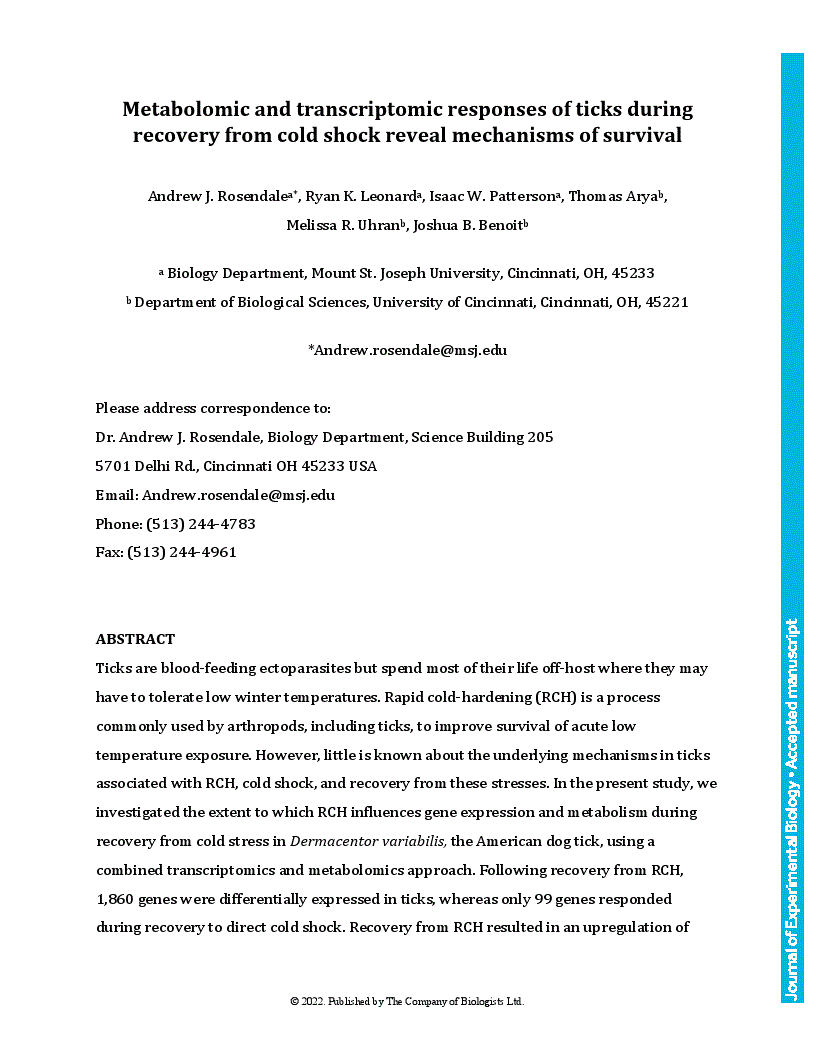Ticks are blood-feeding ectoparasites but spend most of their life off-host where they may have to tolerate low winter temperatures. Rapid cold-hardening (RCH) is a process commonly used by arthropods, including ticks, to improve survival of acute low temperature exposure. However, little is known about the underlying mechanisms in ticks associated with RCH, cold shock, and recovery from these stresses. In the present study, we investigated the extent to which RCH influences gene expression and metabolism during recovery from cold stress in Dermacentor variabilis, the American dog tick, using a combined transcriptomics and metabolomics approach. Following recovery from RCH, 1,860 genes were differentially expressed in ticks, whereas only 99 genes responded during recovery to direct cold shock. Recovery from RCH resulted in an upregulation of various pathways associated with ion binding, transport, metabolism, and cellular structures seen in the response of other arthropods to cold. The accumulation of various metabolites, including several amino acids and betaine, corresponded to transcriptional shifts in the pathways associated with these molecules, suggesting congruent metabolome and transcriptome changes. Ticks receiving exogenous betaine and valine demonstrated enhanced cold tolerance, suggesting cryoprotective effects of these metabolites. Overall, many of the responses during recovery from cold shock in ticks were similar to those observed in other arthropods, but several adjustments may be distinct from other currently examined taxa.
Metabolomic and transcriptomic responses of ticks during recovery from cold shock reveal mechanisms of survival
- Award Group:
- Funder(s): U.S. Department of Agriculture
- Award Id(s): 2016-67012-24652
- Funder(s):
- Award Group:
- Funder(s): National Science Foundation
- Award Id(s): DEB-1654417
- Funder(s):
Currently Viewing Accepted Manuscript - Newer Version Available
- Split-screen
- Views Icon Views
- Open the PDF for in another window
-
Article Versions Icon
Versions
- Version of Record 27 April 2022
- Accepted Manuscript 18 February 2022
- Share Icon Share
-
Tools Icon
Tools
- Search Site
Andrew J. Rosendale, Ryan K. Leonard, Isaac W. Patterson, Thomas Arya, Melissa R. Uhran, Joshua B. Benoit; Metabolomic and transcriptomic responses of ticks during recovery from cold shock reveal mechanisms of survival. J Exp Biol 2022; jeb.236497. doi: https://doi.org/10.1242/jeb.236497
Download citation file:
Advertisement
2023 JEB Outstanding Paper Prize shortlist and winner

The JEB Editors are delighted to announce the shortlisted authors for the 2023 JEB Outstanding Paper Prize. Read the winning paper - Tiny spies: mosquito antennae are sensitive sensors for eavesdropping on frog calls - by Hoover Pantoja-Sanchez and Brian Leavell from Ximena Bernal's lab at Purdue University, USA.
JEB Science Communication Workshop for ECRs

If you’re an early-career researcher interested in science communication and are attending the SEB Annual Conference in Prague this summer, come a day early and join the JEB Editors at a sci comm workshop to learn the key writing skills needed to promote your research to a broad audience beyond your peers (1 July at 14.30-17.30). Places are limited to 24 attendees, and applicants should apply through the SEB registration page by 30 April 2024.
Bridging the gap between controlled conditions and natural habitats in understanding behaviour

Novel technologies enable behavioural experiments with non-model species, in naturalistic habitats and with underexplored behaviours. In their Commentary, Scholz and colleagues discuss how to obtain a deeper understanding of the natural ecology and lifestyle of study animals.
Beluga metabolic measures could help save species

To help save animals from extinction, it’s important to understand what each species needs to survive. This led Jason John et al. to measure the metabolic rates of captive belugas to develop a ‘fish calculator’ showing that the whales need to eat ~23 salmon per day.
ECR Workshop on Positive Peer Review

Are you an ECR looking for tips on how to write concise, astute and useful manuscript reviews? If so, join the JEB Editors at a 2-hour JEB-sponsored Workshop on Positive Peer Review at the Canadian Society of Zoologists annual meeting in Moncton on 9 May 2024 at 13.00-15.00. There are 25 spaces for ECRs and selection is first come, first serve. To sign up, check the ECR Workshop box when you register for the CSZ meeting.



